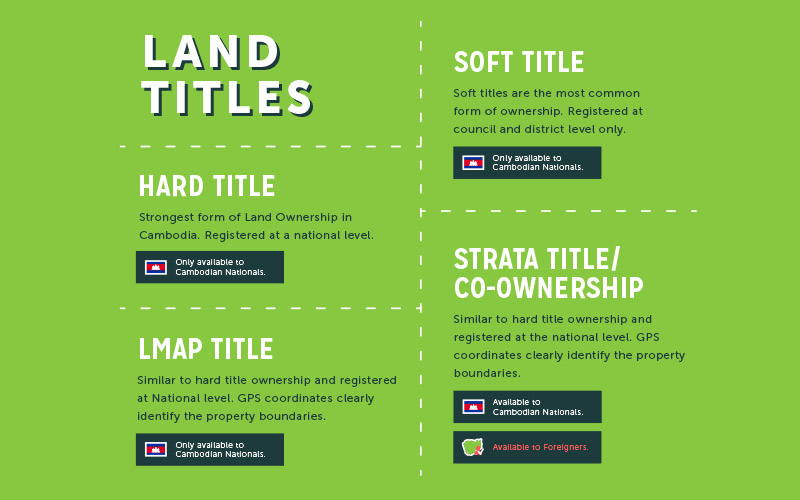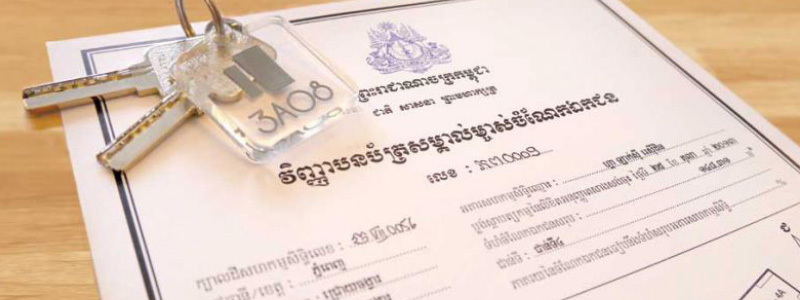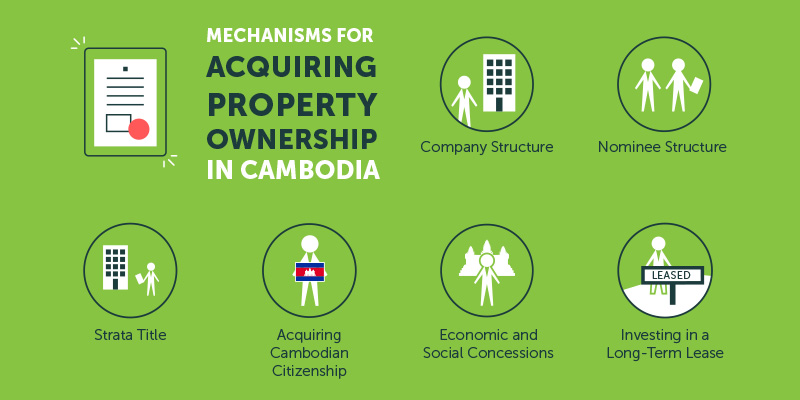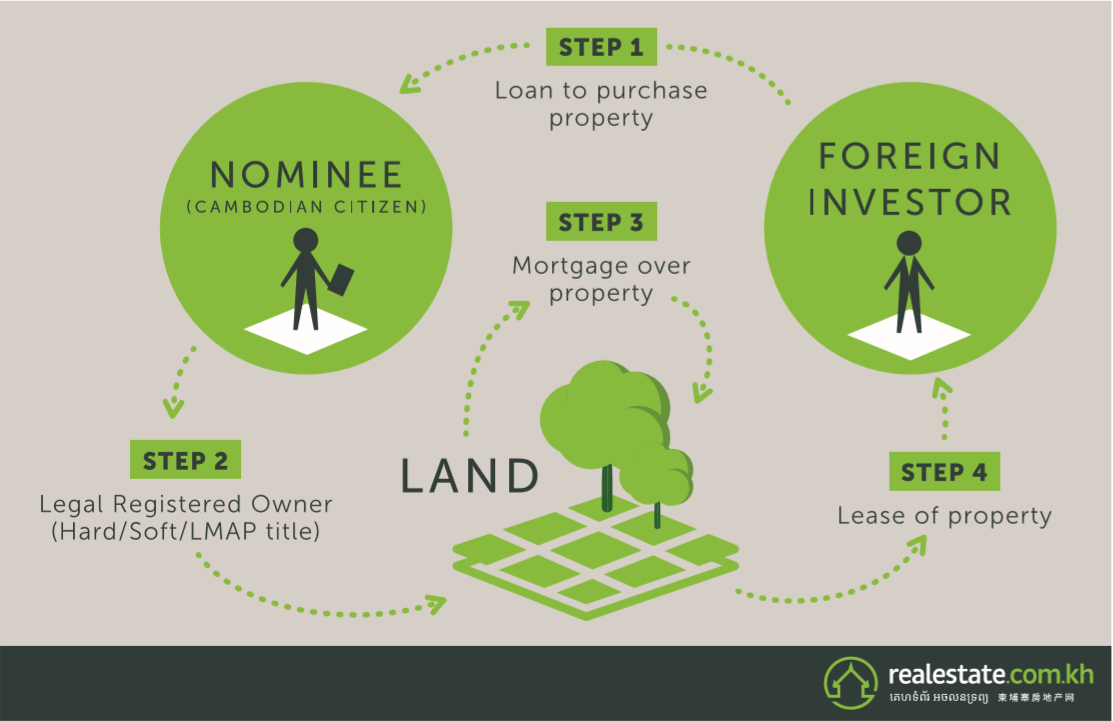2. FOREIGN PROPERTY OWNERSHIP MECHANISMS

2.1 INTRODUCTION TO CAMBODIAN OWNERSHIP LAWS
All Cambodian land title records were destroyed between 1975 and 1979. Consequently, after the war, proving land ownership was almost impossible. In 1989, a succession of new laws and regulations were passed allowing private ownership of land. The 2001 Land Law created the land registry system which serves to issue land titles and remains in place today.
Since 2001, more than two million land titles have been issued to Cambodians. Ownership or possession of property can be proved by one of three different forms of Cambodian land title, a letter of possession (commonly known as a soft title), a certifi cate of title (commonly known as a hard title, which includes the new form of certifi cate called the “LMAP title”) and a form of private ownership in a co-owned building (also known as a strata title.)
Please note, this is simply an overview of the legal mechanisms available in Cambodia. Realestate.com.kh recommends that potential buyers seek independent and professional legal assistance before purchasing property in the Kingdom via any of the methods below.
2.2 HARD TITLES
Hard titles are ownership certificates provided by the Land Department of the Ministry of Land Management, Urban Planning and Construction, and are the official recognition of property ownership in Cambodia.
These titles contain comprehensive information regarding ownership and are passed by the Ministry of Land Management. It is illegal for foreign nationals to own property under a hard title. Hard titles are only available to Cambodian nationals.
It takes approximately four to six weeks to process a hard title transfer. Transfers are additionally subject to a 4% transfer tax based on criteria by the concerned land/cadastral office.
2.3 SOFT TITLES
A soft title is a form of customary ownership in Cambodia and it is the most prolific form of property title amongst Cambodians. Most soft titles are gradually being converted into hard titles, a process which has been ongoing for a number of years.
Soft titles are issued at the district and commune levels only, not the national level. Local authorities can often issue soft titles within 5 to 10 working days.
Although soft titles are not registered at the national level, they are still considered a possessory right to land. Soft title transfers are similarly subject to the 4% transfer tax.
2.4 LAND MANAGEMENT AND ADMINISTRATION PROJECT (LMAP) TITLES
An LMAP title is the latest and most secure form of hard title in Cambodia.
LMAP titles add GPS information lacking from traditional hard titles. These geo-tagged points clearly define the coordinates of the property’s boundaries, avoiding the possibility of any disputes over the land.
LMAP title background:The Land Management and Administration Project was first introduced in Cambodia in 2002 by the World Bank with approval from the government. Its stated goals were to improve land tenure security through registration and issuance of titles, particularly for vulnerable property owners. The Ministry of Land Management is the chief implementing agency for this process.
Benefits of an LMAP title:The LMAP title is the strongest, safest, and most accurate type of land title available in Cambodia.
Prior to the establishment of the LMAP title, the Ministry of Land Management devoted much of its time to resolving land disputes due to a lack of clarity over boundaries. Ultimately, the ministry seeks to put a reliable system in place for the administration of the country’s land.
Holding an LMAP title means the land has been measured by officials and the borders have been agreed upon as this document includes exact GPS coordinates of the property in question. Since an LMAP title gives owners certainty regarding size and boundaries of their land, it can be used as a tool for preventing conflicts with other landowners and often has a higher value because of its reliability.
Process of obtaining an LMAP title:Applying for an LMAP title involves directly communicating with the Ministry of Land Management and other relevant officials. This is due to the fact that an LMAP is recognised at the national level.
Obtaining an LMAP title takes anywhere between six to twelve months as a matter of practice for properties that have already been surveyed.
No specifc service fee is charged for the LMAP title.
The application process involves the landowner submitting the correct documentation and application form to the Ministry of Land Management. Supplementary documents include any receipts, letters or agreements that prove ownership for a property that does not already have a title. Hard or soft titles can be elevated to an LMAP along with a purchase agreement.
Additional documents such as identity cards, family books, birth certificates and marriage certificates are also necessary during the application process.
Once submitted, the application will be checked by the Ministry of Land Management and land officials will examine all the documents. During the application process, the ministry will determine whether the land is eligible. If there are conflicts among landowners during the process, officials can settle the dispute rather than bringing the case to court.
Another major factor to consider is that the LMAP titling process has yet to be implemented throughout the country. Many parts of the country have yet to be surveyed with GPS.
There are three scenarios an owner can run into when seeking an LMAP title:
If the Ministry of Land Management is conducting the LMAP titling process in a village or area where the property in question is located, local authorities have a duty to inform property holders that they are able to register for LMAP titling.
If LMAP titling has already been completed in the area where the property is located, an owner may apply directly to the Ministry of Land Management.
Unfortunately, if the property in question is in an area that has not undergone LMAP titling, owners are unable to apply for an LMAP title. However, owners in these areas can still apply for hard titles before eventually upgrading to LMAP titles.
In order to know if LMAP titles are available in a specifc area, owners may check with local authorities such as village or commune chiefs and ultimately the cadastral office.

2.5 STRATA TITLES (FOREIGN OWNERSHIP OF CO-OWNED BUILDINGS)
2.5.1 Strata Title Overview
In 2009, strata titles were introduced and allow foreigner nationals to fully own private units of co-owned buildings in Cambodia, subject to certain procedures and criteria. The titles were implemented to spur foreign investment in the local property market and simultaneously accommodate an expatriate population seeking ownership over residential and commercial properties in Cambodia.
A strata title refers to the certificate of ownership of an individual unit in a co-owned building. Strata titles are applicable to both residential and commercial properties. For example, an office tower for commercial or residential purposes, a condo building or a mixed-use space within a co-owned high rise can be held under a strata title.
Co-owned buildings are defined as a building or construction in which several owners reside. The space consists of private units that are exclusively held by an individual owner and other spaces that are commonly owned (amenities like lounges, pools, and gyms).
Strata titles allow foreign ownership of up to 70% of co-owned buildings, provided that foreigners purchase property on the fi rst fl oor or above. Foreigners are not allowed to own ground floor units in a co-owned building. At least 30% of a co-owned building must be owned by Cambodian nationals. These conditions apply to buildings with strata titles registered after 2009.
2.5.2 Purchasing Part of a Strata Title Development
Strata title creation:First, the developer acquires the land with a hard title in the name of the development company.
From the original hard title, the developer must then divide the property into a collection of separate hard titles for each individual buyer. These titles each represent portions of ownership within the project.
At this stage, the Ministry of Land Management will also examine the common area situation. The developer must submit a construction permit along with the detailed structural plan to the MLMUPC, and then strata titles will be issued.
Once the titles have been given to the development company they can then be distributed to buyers. Final strata titles are officially applied for after at least 80% of the construction is completed provided that a construction closing permit is obtained.
How to ensure a project has a legitimate strata title:The strata titles are registered at the Ministry of Land Management, which is the authoritative government ministry for title registration. To verify the legality of the title before purchase, buyers should inspect the developer’s hard title and the master development plan, and cross check these documents with the ministries. These documents give buyers access to key information about the owner, property and title classification.
Sales and purchase agreements should also reference strata titles and co-ownership details. No mention of these documents in an agreement should be a major red fag for investors.
In any case, Realestate.com.kh fimly recommends seeking independent and professional legal assistance before purchasing property in Cambodia under a strata title.
2.5.3 Applicable Fees and Taxes for Obtaining a Strata Title

There is a public service fee for the conversion of a hard title into a strata title. There is also a public service fee for each individual strata title transferred to a buyer. A transfer tax is also applicable when transferring a strata title. Once the set of certified documents are reviewed and accepted by the Ministry of Land Management, the exact same documentation with a few supplementary forms is submitted to the General Department of Taxation.
From here, tax officials will issue an assessment for the amount of transfer tax to be paid. The transfer tax is calculated at the rate of 4% of the condominium’s value. The value to be taken into account when applying the 4% is the higher between the consideration paid for the condominium in the underlying sale and purchase agreement or the value of the condo using the prescribed rates issued by the Ministry of Economy and Finance.
After tax payment is approved by the General Department of Taxation, the Ministry of Land Management will finalize the title transfer.
Both the buyer and developer must be present at the Ministry of Land Management for the final transfer to be approved. This means that off-plan buyers need to return to Cambodia for the final processing and handover of strata titles after they’re eligible for distribution.
2.6 FOREIGN OWNERSHIP VIA COMPANY STRUCTURE

Another vehicle available for foreigners to purchase land is through a locally incorporated company. The costs of creating a landholding company can be higher than other types of companies when factoring in ongoing tax and administrative costs. However, for a large-scale investor or property developer, these costs may be insignificant compared to the benefit of being able to purchase land in Cambodia. This also allows the company to hold property with any title type.
A foreign entity may own land through a company, provided that 51 percent of the company is owned by a Cambodian entity. Foreigners can also protect their investments by forming two companies. The Law of Investment allows for investors to use land and take out long-term leases of up to 50 years, which can also be renewed. The property acquired by one company can then be leased to a second one created by an investor. This method can be useful to separate the land and business aspects of a firm.
With a lease to the property acquired through the company, the foreign party can exercise long-term control over the land. In this situation, the land cannot be sold without the consent of both the lessee and lessor. Ultimately, this means any transaction in relation to the land must be given an OK by the foreign investor.
Many consider it safer and more efficient to acquire property through an established company. It enables a foreign investor to gain management control over the company legally and with the proper documentation.
2.7 FOREIGN OWNERSHIP THROUGH NOMINEE STRUCTURE
Nominee structures are not recognised under Cambodian law and are not valid legal structures. Realestate.com. kh firmly recommends seeking independent and professional legal assistance in this scenario.
2.8 FOREIGN OWNERSHIP THROUGH CAMBODIAN CITIZENSHIP
In 1996, the Law of Nationality made it possible for foreigners to apply for Cambodian citizenship based on an amount invested within the country.
Applying for citizenship as an investor will waive the conventional citizenship eligibility process, which involves the foreigner maintaining residency for 7 years (3 if the individual was born in Cambodia), as well as knowing Khmer history, language, and traditions. The citizenship applicant must also prove that he/she does not pose a threat to the safety of the nation and its people.
The 7-year residency requirement can be waived if the foreigner donates $330,000 to the state treasury. All other requirements, however, cannot be waived and must still be satisfied. Once citizenship is granted, the foreigner will be able to own land and property in their own name. Furthermore, the foreigner may apply for certain concessions which are only available to Cambodian nationals.
Due to the benefits of citizenship, it has become a common practice for international companies to send representatives to apply for citizenship, in order to acquire the land or property on behalf of the company. Legislation on Cambodian citizenship laws is currently being revised by authorities.
2.9 INVESTING IN LAND THROUGH A LONG-TERM LEASE
Leasing land is a much easier and less expensive than other ownership options available to foreigners. This option, however, involves the land remaining in the possession of a Cambodian citizen and doesn’t allow the foreigner to resell the property for capital appreciation.
Any lease lasting longer than 15 years must be registered at the relevant land office. Long-term lease agreements have terms of up to 50 years. Long-term leases can even include the right to develop the land.

2.10 INVESTING IN LAND THROUGH CONCESSIONS
A land concession allows a person or legal entity to occupy, use and exercise rights over the land. Concessions are established under a contract or issued by government authorities.
Economic Land Concessions (ELCs) are the most sought-after concessions and are generally allocated for agricultural projects. ELCs, additionally, allow investors to clear land for industrial purposes. They are granted through a 50-year concession and are subject to renewals. Concessions can only apply for plots of 10,000 hectares or less.
The investor must apply through the Ministry of Agriculture for the rights to their specific plot. Representatives from the Ministry of Agriculture, the Council for the Development of Cambodia and the relevant provincial government authorities will also need to approve the application. This includes considering any potential social and environmental effects of the concession.
After these departments have approved the concession, the office of the Prime Minister must sign and authorize the Ministry of Agriculture to formally conclude the concession agreement. The approximate timeframe to complete the process and grant the concession is usually between six and nine months.


- Introduction
- Covid 19 Economic Effects
- Cambodia, A Final Frontier: The Opportunity in Sum
- 1. About Cambodia
- 2. Foreign Property Ownership Mechanisms
- 3. Cambodia Real Estate Sector Overview
Add as Favourite
Please fill personal info before saving favourites. Open Profile Settings.





